

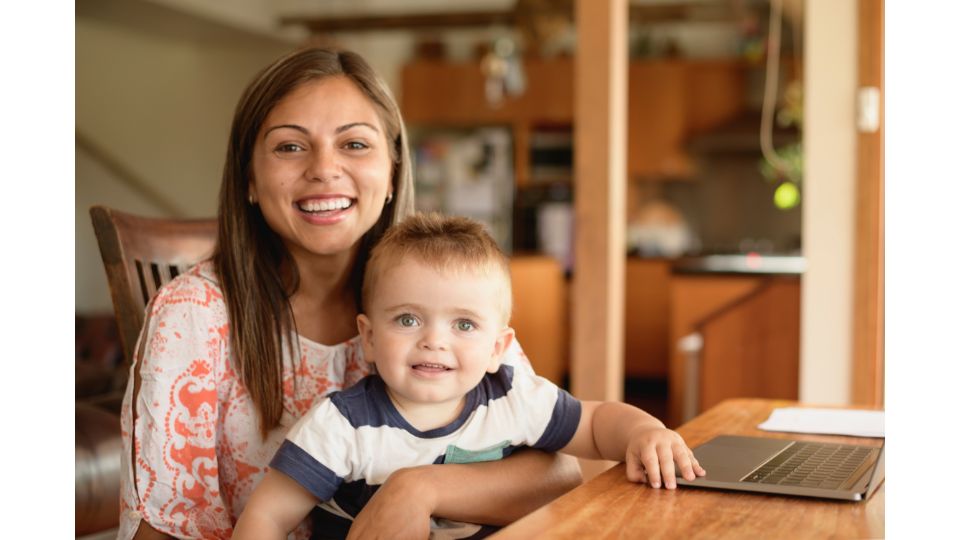
Country people who volunteer to become foster carers offer children and young people, who cannot live with their birth family, a chance to thrive in a safe and nurturing home in their own community.
Part of our role is to support people such as yourself who are considering making a commitment to care for vulnerable young people, to answer your questions and share information about being a foster carer. By reading this information and talking with our team, we hope you gain a clear understanding about how foster care can fit for you, your family and other household members.
There are many things to consider around becoming a foster carer and the information featured on our website covers many of these topics. You are welcome to contact our team at any time to discuss your own circumstances and raise questions.


Foster carers provide a safe and secure home for children who are unable to stay with their birth family. Children in foster care can be any age from birth to 18 years.
Children and young people in foster care may have contact with their birth family while they are living with a foster carer. This is arranged by the Department for Child Protection (DCP).
Respite care involves having a child in care for short stays. This could be regular weekends, school holidays or one off overnight stays.
Respite care gives longer term foster carers a break and allows children to build new relationships and have new experiences.
Emergency foster care may involve an overnight stay or last for up to two weeks.
Carers who provide emergency care can be contacted at short notice at any time of the day.
Short-term care can last from two weeks to two years. The aim is to give the birth family some time to manage a difficult issue.
The child may then return to their birth family if it is appropriate, or they may be placed in long term care.
for some children, returning to their birth family is not possible. Long-term care is provided until family circumstances change or until the child turns 18.
What does foster care involve?
Foster carer qualities
Foster carers can be
Carers have a positive attitude
Foster carers must have a positive attitude and demonstrate common sense, patience, understanding, maturity, a sense of humour and flexibility, including:
Carers provide a safe and stable environment
Stability and safety are an important focus in providing care for young people who have been removed from their birth family and familiar environments. Children who have been removed from their homes experience trauma which can lead to difficulties in adapting to change, therefore it is important that foster carers provide a safe and stable living environment.
Support network
Caring for children and young people can be a challenge at times, so it is important for foster carers to have a reliable network of practical and emotional support in place from their family, friends and community. For example, a foster carer’s support network may provide practical help with babysitting or transport.
Child focus
Foster carers provide a nurturing home environment that promotes a sense of belonging and positive identity for children and young people. This includes:
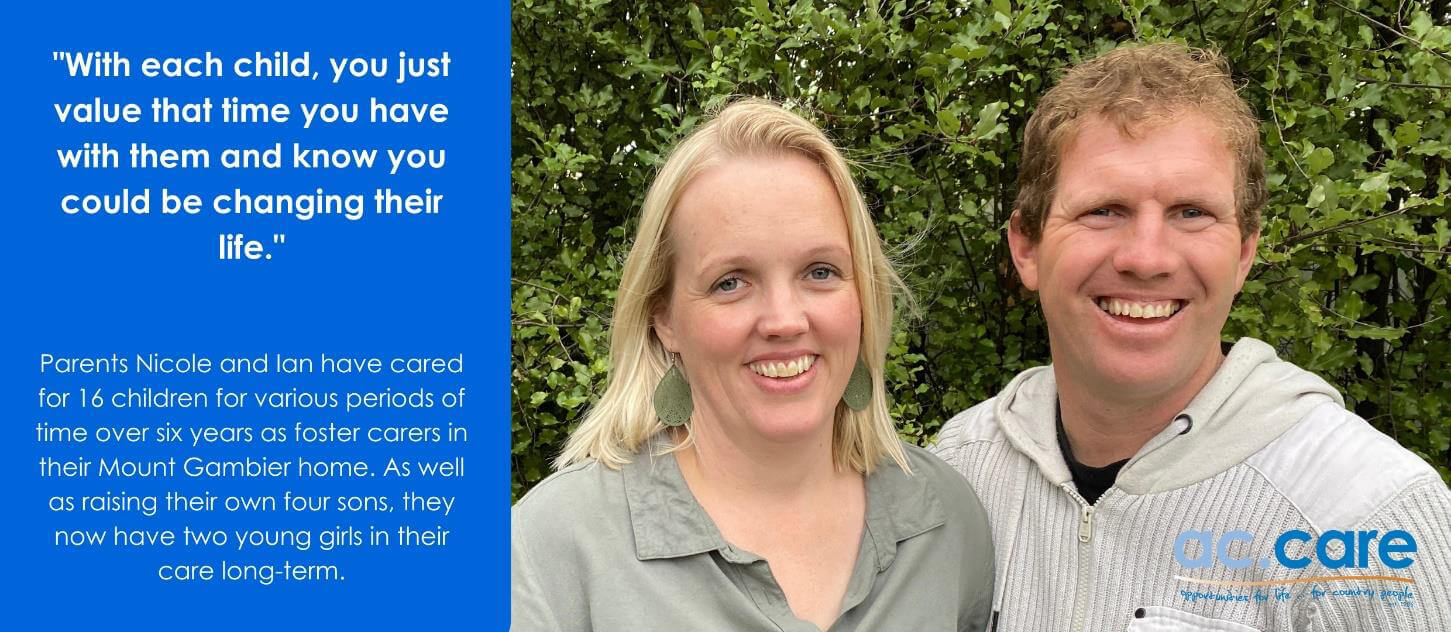
Nurturing care
Children and young people that have experienced abuse and neglect require nurturing care. This contributes to a child coming to terms with the adversity they have experienced and positive experiences in foster care. For many children, their first experiences of warmth, empathy and playfulness may occur in a foster care home.
Nurturing care builds a child’s sense of love, attachment and security. Foster carers are best supported to do this when they understand the effects of developmental trauma and attachment. Developmental trauma refers to the trauma endured during childhood when experiences of abuse and neglect have impacted on a child’s emotional, physical, psychological and cognitive development. Attachment refers to the bonding (emotional connection) between a child and their caregiver.
Foster carers receive initial and ongoing learning opportunities around developmental trauma and attachment to support them to provide nurturing care to young people. One of the models foster carers are trained in regarding nurturing care is the PACE model – Playfulness, Acceptance, Curiosity and Empathy. More information is available in the ‘learning and development’ section on page 16.
Life domains
Life domains refer to the significant aspects of a child’s life which support their development and opportunities to reach their full potential. The ‘care team’ is responsible for ensuring a child’s life domains are supported so that they are encouraged to have hopes and visions for their future. For more information about the role of the ‘care team’ refer to page 14 below in ‘working with others’.
Broadly a child’s life domains include:

Care of Culturally and Linguistically Diverse (CALD) children and young people
The Department for Child Protection and ac.care have a commitment to placing CALD children and young people with carers who share their cultural background.
The Children and Young Person (Safety) Act 2017 informs the practices of ac.care and the Department for Child Protection. The legislation requires that consideration is given to a child and young person’s culture, disability, language and religion and those in whose care children and young people are placed.
Where children are unable to be placed with culturally appropriate carers, Non-CALD carers are able to provide for a CALD child or young person. Carers are expected to support the child’s ongoing connection with the child’s CALD culture.
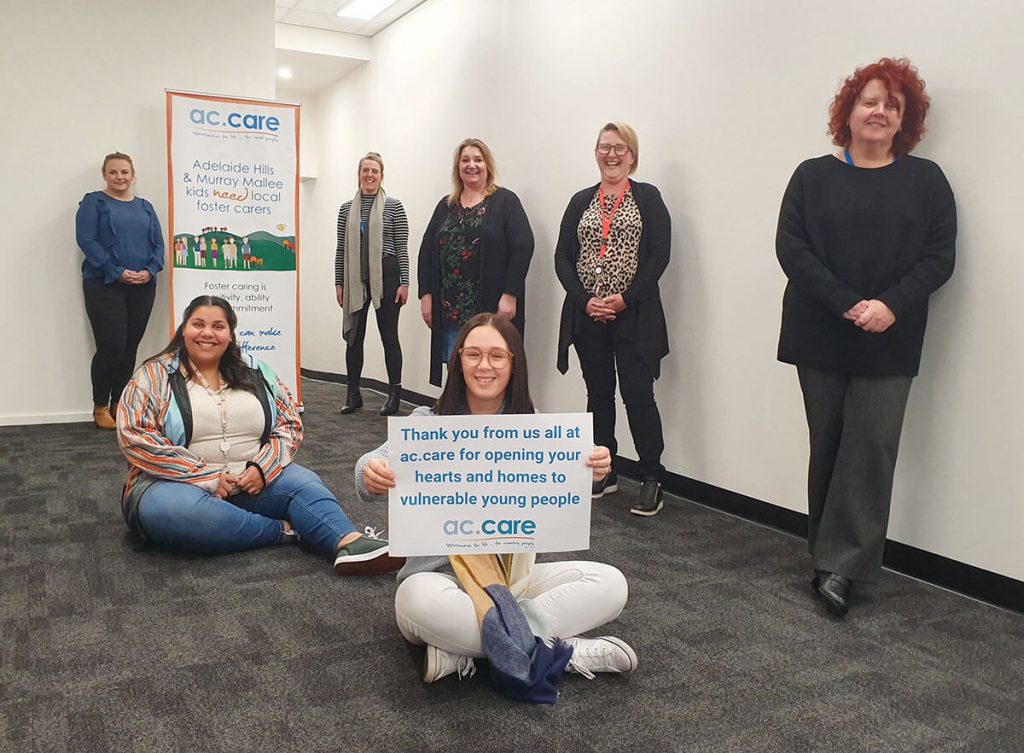
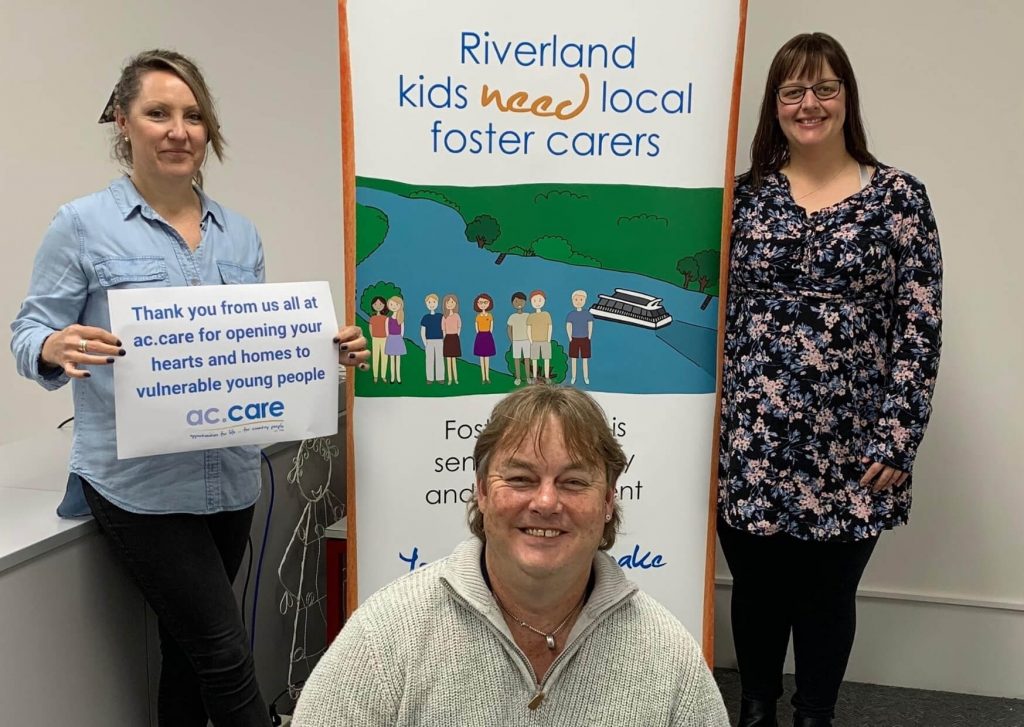
Foster carers benefit from support and guidance to provide the best possible care for vulnerable young people within a safe and stable home.
ac.care provides support to foster carers 24 hours a day, 7 days a week in a comprehensive and adaptive way to match the needs of carers and young people. Our team provides support for every step of the foster care journey beginning with ac.care helping prospective foster carers in their consideration, this progresses to working through the application and assessment steps through to become a registered carer. Our tailored support for a registered foster care household includes:
Individual support
All carers are allocated an ac.care placement support worker (PSW) who will become their key contact person within ac.care. They are available over the phone or via email and will visit your home every 8 weeks as a minimum and more frequently where required. For example, when a young person is first placed within your home, your placement support worker will be available to visit more frequently depending on your support needs.
Foster carers develop strong and open relationships with their placement support workers, who share the journey every step of the way. Your placement support worker will help you to understand and navigate the complexities of foster care and relationships. They will communicate with you about:
Care Team
Foster carers, the Department for Child Protection and ac.care as the support agency form part of a ‘care team’ for children and young people who are under guardianship of the Chief Executive of the Department for Child Protection. The Chief Executive of the Department for Child Protection is the legal guardian of children in foster care.
Caring for a young person in foster care involves working collaboratively with a team of people who share the responsibility of their care and development. Foster carers are essential members of the care team making day to day decisions about a child in their care and are supported to participate in decision making around a child’s health, safety, welfare and wellbeing.
This group of people is often referred to as the ‘care team’ and involves the:
It may also involve the birth family, other family members and relevant professionals in the young person’s life, such as teachers, psychologists, paediatricians or other medical professionals.
Working with others
Foster carers have a capacity to work with others in order to meet the life domains and care needs of a child. This will involve a willingness and ability to communicate with and participate in the ‘care team’ for planning and reviewing of the child’s care and opportunities for development. Foster carers demonstrate:
Financial support
ac.care does not provide direct, ongoing financial support to foster carers, however the Department for Child Protection provides assistance to foster carers through the ‘Carer Support Payment’ to help meet the costs of caring for a child.
All school students in foster care are eligible for the South Australian School Card. It offers financial assistance with educational expenses for students attending government and non-government schools. Foster carers may also be eligible to receive additional payments from the government, such as family tax benefit, the parenting payment and payments to help families.
Refer to information on the Department for Child Protection website to find out more about carer payments, including additional payment for children with special needs and incidental payments.
The knowledge and skills of foster carers contribute to providing care in a safe and secure environment and can positively influence a child’s experience. ac.care works alongside foster carers to encourage and support their ongoing commitment to learning and development. This includes supporting carers to develop nurturing, trauma-informed and responsive care.
Recognising current skills and knowledge, we work with foster carers to develop individualised plans for engagement in a tailored range of learning and development opportunities. These include mandatory training through to specific areas of learning to support carers both personally and as caregivers. Opportunities for learning are flexible, occurring through face to face and online platforms and extend beyond business hours to evenings and flexible correspondence study where required.
Mandatory training
There are training areas which are mandatory requirements during the application and assessment process to become a foster carer, referred to as ‘pre-approval training’. This includes a two-day foundational foster care orientation, along with training in safe care of infants, mandatory reporting and first aid. Foster carers are required to update their knowledge and skills in these mandatory training areas on an ongoing basis to maintain registration. For more detail on the mandatory training requirements refer to page 25.
Further learning
Outside of the mandatory training requirements, foster carers are encouraged to engage in further learning opportunities to develop their knowledge and skills. For example, during the foster care assessment process, you and your assessment worker will identify specific areas where training can support the start of your fostering journey. Additionally, when a young person is placed with a foster carer, training may be identified for a foster carer to best meet the child’s specific care needs. Some of the further learning areas include:
If you are interested in finding out more about the further learning opportunities, please contact us and we can provide additional information.
Care consultation
ac.care supports foster carers through clinical consultation opportunities with Dr Ivan Raymond of the Life Buoyancy Institute Foundation (LBI Foundation). Dr Raymond is a clinical psychologist with over 20 years of experience in working with people in out of home care (OOHC). He is a leading expert in intentional practice, wellbeing, resilience and trauma. Dr Raymond facilitates carer training groups, webinars and one-on-one consultation with carers.
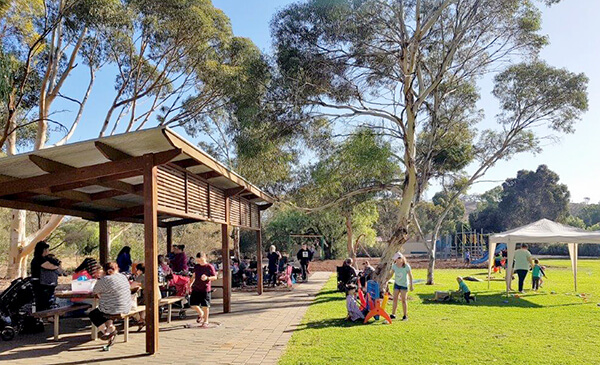

The current carer community ac.care support includes over 180 households, caring for close to 400 children, who are located across a large geographical area in the Limestone Coast, Riverland, Murray Mallee, Fleurieu Peninsula and Adelaide Hills.
ac.care recognises there are many benefits to foster carers connecting with their local carer community, including peer support and understanding. To assist with these connections, ac.care schedules regular social events, such as morning teas and annual celebrations, including Foster Carers Week in September and festive season events, which involve the whole foster care household.
ac.care does not provide direct, ongoing financial support to foster carers, however the Department for Child Protection provides assistance to foster carers through the ‘Carer Support Payment’ to help meet the costs of caring for a child.
Visit the Department for Child Protection (DCP) website to read more about carer payments and download the Carer Support Payments handbook for specific amounts.
There are several steps in the process of becoming a registered foster carer. Due to the complex nature of foster carer applications and assessments, generally this will take from six to nine months and includes these steps:
Registration of Interest
Information exchange meeting
Submission of application and background screening checks
Assessment interviews and training
Submission of the assessment to the Department for Child Protection for approval
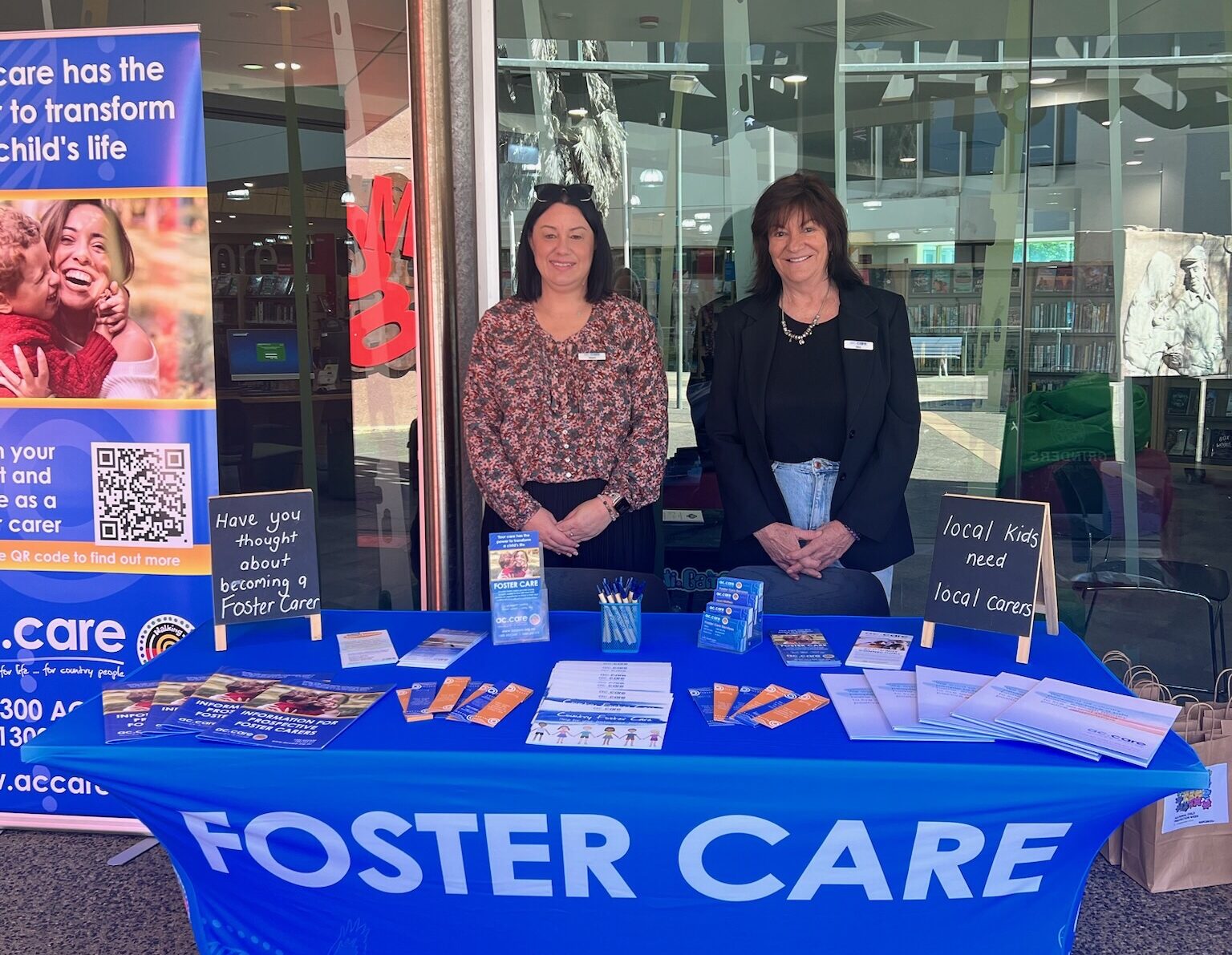
ac.care assessment worker
Right from the start, when you register your interest in becoming a foster carer, you will begin working with an ac.care assessment worker. This person is part of our foster care team and normally located within your region. Your assessment worker will work closely with you during the whole process. They will be your primary contact for the application, assessment, approval and registration steps.
Background screening checks are a requirement of all foster care applications. A thorough assessment is required of each carer and household to ensure the safety of children placed in foster care homes. This includes:
Home safety check
Your assessment worker will visit your home and undertake the home safety check with you. This identifies any safety risks where you may need to make changes to meet the home safety requirements. Examples of the safety requirements include:
Personal referees
You will be asked to provide two personal referees who are unrelated but have known you for at least two years and can comment on your background, experience and suitability to care for children and young people.
Privacy
The information provided in your application, including background screening, consent to share information and any further information will be treated confidentially and will not be used without your prior consent for any purpose other than to assess your application for foster care. ac.care abides by the Privacy Act 1988 and adheres to the Australian Privacy Principles in collecting, storing and managing personal information. ac.care is committed to protecting individuals’ rights of privacy and confidentiality while delivering quality services.
Once the foster care application and background screening checks are complete, pre-approval training and assessment interviews will commence. Initially all applicants will undertake foundational training called ‘Shared Lives’, which is facilitated over two days. Following its completion, there are approximately five face-to-face assessment interviews with your assessment worker. The number of interviews may increase depending on your circumstances. Other pre-approval training requirements will be scheduled during this time.
The pre-approval training helps develop the knowledge and skills required to become a foster carer. Mandatory training sessions for all foster care applicants are as follows:
Shared Lives
A foundational foster care orientation training program facilitated over two days. Shared Lives provides applicants with an overview of children in care, their responses to trauma, family contact and how to manage one’s own responses to challenging behaviours. Key topics:
Safe Environments for Children and Young People (Through their Eyes)
This one-day training program covers the responsibilities of foster carers as mandatory reporters. The course explains the Department for Child Protection system in context, different types of child abuse and neglect, how to make a notification to the child abuse report line (CARL) and how to respond to disclosures of child abuse and neglect. every 3 years.
Safe Care of Infants
This training course was developed by Kidsafe SA and provides the safest and most current practices for the care of infants placed in foster care, as well as injury prevention for all children and young people. Information covered includes understanding the range and incidence of preventable childhood injuries and strategies to reduce preventable injuries and increase safety of the home environment. For example, safe infant sleeping practices. Refresher training is required every 2 years.
Provide First Aid
This training course is run by St John and covers first aid response in a range of situations until the arrival of an ambulance. Foster carers are strongly encouraged to attend first aid refresher training every 3 years.
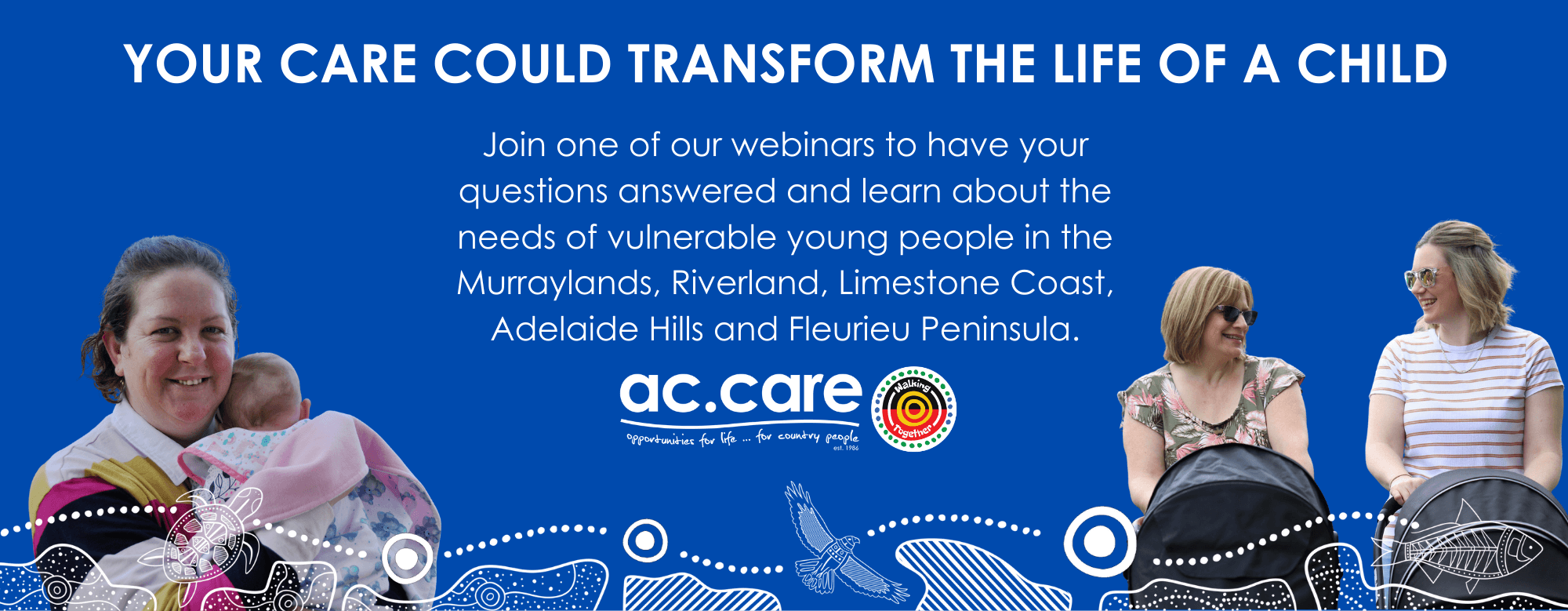
Our inspiring foster carers open their hearts and homes to hundreds of young people in need across eastern regional South Australia, transforming the lives of vulnerable children and youths.
But we need more people to join our network of carers – to provide long-term, short-term, occasional or respite care – for the growing number of young people in care with nowhere to call home.
Find out more about what is involved in becoming a foster carer and how ac.care will support you along every step of the journey by participating in one of our online information sessions.
Our webinar-style online events will feature ac.care staff members available to answer your questions.
The online information sessions will run for up to 30 minutes and cover general information about the role of foster carers, types of care, support available and the approval process to become a carer.
We do not currently have a foster care webinar scheduled, but if you would like to join our next session or for us to get in contact to discuss foster care with you in person or over the phone, please provide your details in the event registration form below and we will be in contact.
There is no ‘hard sell’ in the online or in-person sessions – it’s an opportunity to learn more and meet the ac.care staff who will help by answering questions and assisting with the assessment procedure if you choose to become a foster carer.
Our network of foster carers are greatly valued by ac.care and we continue to work in partnership with our carers, supporting them every step of the foster caring journey, with staff on call 24/7.
The time it takes to become an approved foster carer varies.
Applicants are encouraged to progress at their own pace, however on average the process takes between 3 – 6 months.
Children and foster carers are matched according to the child’s needs and the preferred family structure of the carer or carers.
To minimise disruption to the child, they usually stay in their local area wherever possible.
If a child is staying for a short period they will usually remain at their own school so they continue to have contact with familiar people and places.
If it’s a long term placement then schooling options for the child would be discussed in partnership with the child’s case worker.
Yes.
Holidays are often an experience that children and young people have not had. You will need to talk with the child’s case worker as it may affect regular contact with a parent.
Yes.
You can give your preference about the age and gender of a child you think would fit best with your family and lifestyle.
No.
You do not have to declare the subsidy you receive for the child or young person as income.
Yes.
You can discuss your particular area of interest and what type of care you think may be suited to your family with your fostering agency.
Yes.
It’s important to include your family and all your household members in discussions about becoming a foster carer. All household members will need to meet with the fostering assessment worker and be involved in the process of becoming a foster carer.
Yes.
Foster carers are volunteers. Your fostering agency will always discuss placements with you.
No.
Each child in foster care has a case worker who is responsible for arranging birth family access. Arranging birth family access is not the responsibility of the foster carer.
Foster carers details are not provided to birth families.
Some people begin by attending an information session about foster care where they can have their questions answered.
If you have particular questions about foster care it can be helpful to contact us direct.
When you become a carer with ac.care you can nominate the type of care that would best you’re you and your family.
You can nominate an age range of the children you would like to care for and the gender to suit your family and these may be modified as your circumstances change.
When you become registered as a foster carer you can choose when you take on the placement of a child and can say no to a placement at any time if it does not fit in with your current commitments.
The requirements to become a foster carer is that you are able to provide a safe and nurturing home environment and it is recommended that foster children do have their own space. Foster carers may choose to foster more than one child which enables siblings to stay together and they can be placed together, if appropriate. This will be discussed with the ac.care support workers at the time of placement.
8724 5476
Becoming a foster carer can be very rewarding If you are interested in becoming a foster carer the first step is to contact ac.care to arrange a time to speak with one of our team. Following this you submit your application and begin the assessment process.
Foster carers are normal everyday people who have chosen to provide foster care as a way of supporting their community.
People who care for children from all cultural and religious backgrounds
Anyone with a passion to care for children, committed and has the time to provide a high standard of care for children.
Anyone that can provide a safe nurturing and stable environment for children to develop and grow. Someone who wants to learn more about providing better care for children. Someone who can work as part of a team

ac.care is a dynamic organisation servicing the South Australian communities the Limestone Coast, Murraylands, Riverland, Adelaide Hills and Fleurieu Peninsula.
Our mission is for all country people to have a safe home, enough money to live on and strong, positive relationships.
Please find our service locations here or use our contact form to request a service.